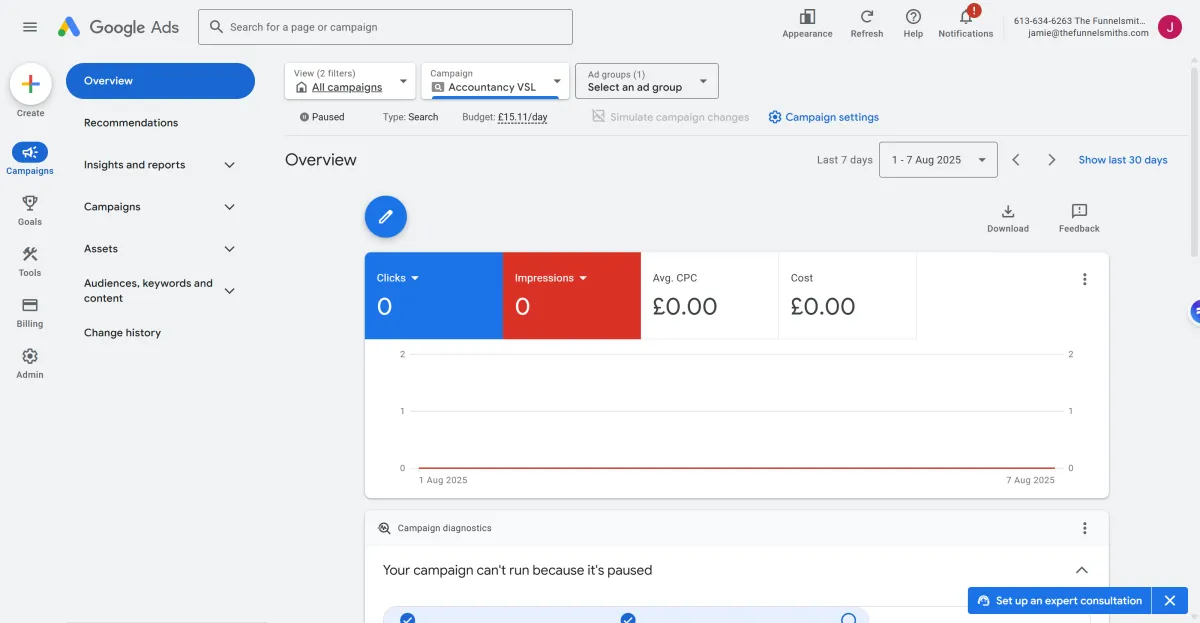
Google Ads for Accountants: Getting Started Guide
Google Ads for Accountants in the North West: The Complete, Step-by-Step Guide to Winning More Clients
Why North West Accountants Need Google Ads Now
In today’s competitive accountancy market across the North West — from Liverpool and Manchester to Preston and Chester — relying solely on word-of-mouth or seasonal tax-time referrals is no longer enough. Prospective clients are turning to Google every day to find accountants who can help them with bookkeeping, tax returns, payroll, and specialist business advice.
Google Ads allows your practice to appear right at the top of search results exactly when a business owner is looking for an accountant in their area. Whether they’re searching for “VAT accountant in Liverpool” or “CIS tax returns Manchester,” your ad can put your name in front of them at the moment they’re ready to act.
The Local Advantage — Why Google Ads Works for Accountants in the North West
High-intent searchers: Someone typing “accountant near me” or “small business tax help in Preston” is already looking to hire.
Geo-targeting: You can focus your budget on your exact service area — e.g., a 20-mile radius around your office, or specific towns like Warrington, Lancaster, or Wigan.
Immediate visibility: Unlike SEO, which can take months, Google Ads can put you on page one of search results tomorrow.
Flexible budgets: Start small (as low as £10/day) and scale as results come in.
Step-by-Step: Setting Up Your Google Ads Campaign for Accounting Services
Step 1 – Create Your Google Ads Account
Go to ads.google.com and click Start Now.
Log in with your Google account (or create one).
Choose Expert Mode when prompted — this gives you full control over targeting, keywords, and bidding.
Step 2 – Choose the Right Campaign Type
Select Search Campaigns (text ads that appear in Google search results).
Set your campaign objective to Leads — this will optimise for calls, form submissions, and bookings.
Step 3 – Set Your Geo-Targeting
Use Radius Targeting — for example, 20 miles around Manchester city centre, or postcodes covering your client base.
For multi-office practices, create separate campaigns per location for more control over spend and performance.
Step 4 – Select the Right Keywords
Use Google Keyword Planner to find relevant, high-intent terms.
Example local keywords:
“Accountant Liverpool”
“VAT return help Preston”
“Payroll services Bolton”
“Bookkeeping for sole traders Blackpool”
Include service + location combos for maximum relevance.
Add negative keywords to avoid wasted clicks (e.g., “free accounting software,” “accounting courses”).
Step 5 – Create Your Ad Groups
Organise by service: one ad group for “Tax Returns,” another for “Payroll,” another for “Bookkeeping.”
Match ad copy to the keyword theme to improve Quality Score and reduce cost per click.
Step 6 – Write Compelling Local Ad Copy
Use clear, benefit-driven headlines:
“Trusted Liverpool Accountants – Free Consultation”
“Small Business Tax Experts in Manchester – Fixed Fees”
“Get Your VAT Return Sorted – North West Specialists”
Include local trust signals:
Years in business
Local office address
Industry specialisms (e.g., construction, retail, hospitality)
Use Call Extensions (tap to call from mobile) and Sitelink Extensions (“Book a Call,” “Services,” “About Us”).
Step 7 – Set Your Budget & Bidding Strategy
For most small-medium accountancy practices: £300–£1,000/month is a good starting point.
Begin with Maximise Conversions bidding — Google’s AI will optimise for leads.
As data builds, consider Target CPA to control your cost per lead.
Step 8 – Build a Conversion-Focused Landing Page
Never send traffic to your homepage.
Your landing page should:
Have a clear headline matching the ad
Show client testimonials (ideally local)
Include a simple contact form & phone number at the top
List your services & industries you serve
Feature trust badges or associations (e.g., ICAEW, ACCA)
Step 9 – Set Up Conversion Tracking
Use Google Tag Manager to track:
Form submissions
Phone calls
Clicks to email
Connect Google Ads to Google Analytics 4 for deeper insights.
Step 10 – Monitor, Optimise & Grow
Check your Search Terms Report weekly — add negative keywords to cut waste.
Test new ad copy monthly.
Adjust bids based on top-performing keywords.
Scale spend on what’s converting — cut what’s not.
Strategies to Get the Best Results for Accountants in the North West
1. Target Industry Niches
Create campaigns aimed at sectors you know well, e.g., “Accountant for Construction Firms in Manchester” or “Hospitality Payroll Specialists Liverpool.” These niches have less competition and higher conversion rates.
2. Seasonal Campaigns
Run extra campaigns in:
Jan–April: Self-Assessment tax returns
Quarterly: VAT submissions
Year-End: Annual accounts
3. Leverage Local Reviews
Include “Rated ★★★★★ on Google” in your ads and landing pages. Local reviews boost trust instantly.
4. Competitor Targeting
Bid on competitor names (carefully and within Google’s rules). Example: “Looking for an alternative to [Competitor Firm]? We offer fixed-fee packages.”
5. Remarketing
Set up remarketing to re-engage visitors who didn’t convert the first time — show them tailored ads reminding them of your services.
Common Mistakes to Avoid
Using broad keywords like “accountant” without location/service — leads to wasted budget.
Ignoring mobile optimisation — over 70% of local service searches happen on mobile.
Not tracking conversions — if you can’t measure it, you can’t improve it.
Pointing ads to your homepage — always use a tailored landing page.
Key Takeaways
Google Ads can put your practice at the top of search results in your exact service area.
Start with a clear structure: geo-targeting, service-specific ad groups, high-intent keywords.
Use strong localised ad copy and conversion-focused landing pages.
Monitor, optimise, and scale campaigns based on data.
When done right, Google Ads isn’t just marketing — it’s an on-demand client acquisition machine for accountants in the North West.

